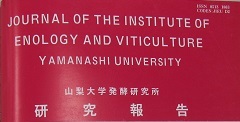

 |
山梨大学醗酵研究所 研究報告[1254年-1997年] JOURNAL OF THE INSTITUTE OF ENOLOGY AND VITICULTURE |
| vol.20 (1985) |
|
「32ブドウ品種の種子及び果皮から分離したフェノール化合物のペーパークロマトグラフィー 」 Paper Chromatography of Phenolic Compuounds from Seeds and Skins of 32 Grape Varieties. 野崎和彦・横塚弘毅 KAUHIKO NOZAKI and KOKI YOKOTSUKA (Laboratory of Wine Chemistry, Institute of Enology and Viticulture, Yamanashi University) pp.1-15[PDF] |
|
32ブドウ品種の種子及び果皮から50%エタノールを用いてフェノール化合物を抽出し、これらのフェノール組成を2次元ペーパークロマトグラフィーにより調べた。各品種の種子及び果皮にはそれぞれ特有のフェノール成分が含まれ、果皮は種子よりも多種のフェノール成分を含有した。タンニンは全品種の種子と果皮に、エピカテキン及びカテキンは大半の品種の種子と果皮に含まれ、全フェノール量に対す津含有量の割合も高かった。その他のフェノール成分は、ある程度限られた品種に検出された。果皮フェノールは種子フェノールよりもブドウ系統間でクロマトパターンがより異なったことから、ブドウの果皮のフェノール組成を比較検討することによりブドウ品種間の類縁関係の推定が可能であると考えられる。 Phenolic compounds were extracted with 50% ethanol from the seeds and skins of 32 grape varieties produced in the Institute vineyards. The phenolic compounds were separated by two-dimensional descending paper chromatography with the upper layer of n-butanol, acetic acid, and water (4:1:5, v/v) and 2% acetic acid. The individual compounds on the chromatograms were characterized by Rf values, fluorescence under UV light, and vanillin-HCI reaction. The chromatograms of the skin phenols were more complex than those of the seed phenols. There were apparent differences in the chromatograms between the seeds and skins. The chromatograms varied considerably with the varieties, but some phenolic compounds including catechin and epicatechin were observed on most of the chromatograms. |
|
[ノート] 「甲州種ブドウのポリフェノールオキシダーゼ活性に及ぼす果実貯蔵温度の影響」 Effect of Storage Temperature on Polyphenol oxidase Activities of Kosyu Grapes. 中村 和夫 ・天野 義文 ・加賀美元男 KAZUO NAKAMURA, YOSHIFUMI AMANO, and MOTOO KAGAMI (Department of Fermentation Technology, Faculty of Engineering, Yamanashi University) pp.17-20[PDF] |
|
甲州種ブドウを3種類の温度で貯蔵した時、それぞれの貯蔵果実より調整した果汁のポリフェノールオキシターゼ活性およびこの酵素のアイソザイムパターンが貯蔵温度により、どのような影響を受けるか検討した。試料のブドウは収穫後、ブドウ房を3つに区分けし、各温度(-20℃,4℃,25℃)で10日間貯蔵し、その間、適宜分析した。ブドウ果実をホモジナイズしナイロン布で搾汁した試料をホモジネートとして酵素活性を測定した。-20℃で保存したブドウからのホモジネートの活性は、4℃の場合の約2倍であった。4℃で保存している期間中、酵素活性はほとんど変化しなかった。25℃保存の場合は活性が徐々に減少した。-20℃と4℃に貯蔵したブドウより作成したアセトンパウダーから祖酵素を抽出し、ポリフェノールオキシダーゼ活性を測定したところ、-20℃で保存した場合の粗酵素の比活性は、4℃の場合の約2倍であった。この粗酵素液をポリアクリルアミドスラブゲルディスク電気泳道にかけたところ、ポリフェノールオキシダーゼ活性を示すバンドの数は、-20℃の方か4℃の場合よりも少なかった。
The effects of storage temperature of Koshu grapes were studied on the polyphenol oxidase activity of the grape juice. The grape clusters harvested were stored at three different temperatures (-20℃,4℃,25℃) for the period from 0 to 10 days before analysis. Each of the the grape berries at the three temperatures were homogenized separately and then filtered through nylon cloth layers. The enzyme activity of the filtered homogenate of the grapes stored at -20℃ was twice as the activity of the grapes sored at 4℃. The enzyme activities of the grapes during the period of storage at 4℃ were hardly changed for 10 days. The storage of the grapes at 25℃ decreased in the activities gradually. The crude enzyme solutions were extracted from the acetone powders made from the grapes stored at -20℃ or 4℃. The specific activity of the enzyme solution made from the grapes stored at -20℃was about twice higher than that of the solution from 4℃ storage grapes. The extracts were applied to the polyacrylamide slab gel disc electrophone sis. The number of the enzyme active bands of the grape sample stored at -20℃ were smaller than that of 4℃ stored grapes. |
|
[資料] 「山ブドウの経時的成分変化」 山川祥秀・守屋正憲・穴水秀教 Seasonal Changes in Some Constituents of Four “Yamabudo” Grape Varieties YOSHIHIDE YAMAKAWA,MASSANORI MORIYA, and HIDENORI ANAMIZU (The Experimental Vineyard, The Institute of Enology and Viticulture, Yamanashi University) pp.21-25 [PDF] |
| abstractなし |
The Institute of Enology and Viticulture, University of Yamanashi 所在地:〒400-0005 山梨県甲府市北新1丁目120 |
ホ-ムペ-ジに掲載の文章・記事・写真・図表などの無断転載を禁止します。